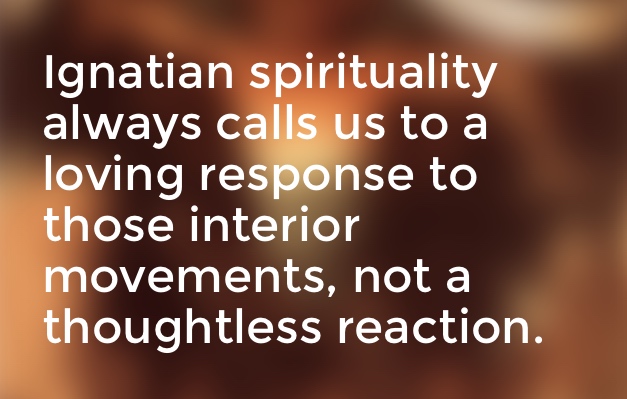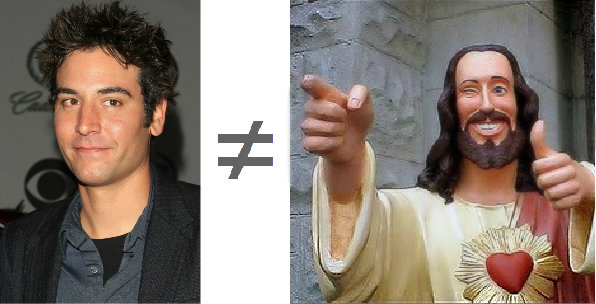
The Temptation of Christ by the Devil by Félix Joseph Barrias (1822 – 1907)
One of the greatest fallacies, I think, is always attributing our pain and sin to an external cause, to shift the “blame” to someone or something else. I’ve lately been aware of the pervasiveness of negativity and evil, not just in the world and our culture at large, but in each of us, myself included. The reality is that much of our suffering comes from our reaction to an external force. Someone says something hurtful and I dwell on it. A decision is made and I take it personally. Ignatius might call this the evil spirit working through those externals, creating this disquiet and agitation within us. In fact, his Rules for the Discernment of Spirits outlines the ways the evil spirit creeps in and derails our peace.
It’s important to understand that the evil spirit is different than the “Devil” as Christianity has historically personified (thanks much to Dante), which unfortunately took the attribution of sin and suffering to an external force to the extreme. “The Devil made me do it!” It’s much easier to say that an external force is the cause of our troubles and sin than to acknowledge our own agency. The evil we witness in the world is caused by human failings, not by an evil force that is beyond humanity’s control. Ignatian spirituality sees the tensions between good and evil primarily within our own heart. More often than not it’s our reactions and responses to the externals that cause our suffering. Teresa of Avila said, “For the most part all [our] trials and disturbances come from our not understanding ourselves.” Our reactions and responses are choices that may be internal or external, but we need enough self-awareness to understand that we are making them. Teresa understood, like Socrates, the importance of an examined life. Sin and evil are not created elsewhere and injected into us. Our collective sin and failings are what make the Devil!
 Violence and terrorism, hate and bigotry… those are borne from people—both individuals and groups—who are blinded in some way. They’re blinded to their capacity to love. When Ignatius says that the evil spirit knows our weak points and uses them in order to attack us, he says we must know our weak points! When we’re blinded to them because of a lack of self-knowledge we simply fall into a default mode of aimless choices and reactions. In other words, we lack full agency to make good choices, and so we make poor ones. The doctrine of Original Sin is not a cop-out for our sin, but more of a blindness to our weaknesses. Ignatius knew that it wasn’t enough to blame the evil spirit as an external force; we have culpability in our bad choices and need to keep our weak points in check. Sometimes the spontaneous, un-checked feelings, emotions, and reactions within us do indeed feel like they comes from an external force even though they arise on their own from within. But Ignatian spirituality always calls us to a loving response to those interior movements, not a thoughtless reaction (where sin can occur).
Violence and terrorism, hate and bigotry… those are borne from people—both individuals and groups—who are blinded in some way. They’re blinded to their capacity to love. When Ignatius says that the evil spirit knows our weak points and uses them in order to attack us, he says we must know our weak points! When we’re blinded to them because of a lack of self-knowledge we simply fall into a default mode of aimless choices and reactions. In other words, we lack full agency to make good choices, and so we make poor ones. The doctrine of Original Sin is not a cop-out for our sin, but more of a blindness to our weaknesses. Ignatius knew that it wasn’t enough to blame the evil spirit as an external force; we have culpability in our bad choices and need to keep our weak points in check. Sometimes the spontaneous, un-checked feelings, emotions, and reactions within us do indeed feel like they comes from an external force even though they arise on their own from within. But Ignatian spirituality always calls us to a loving response to those interior movements, not a thoughtless reaction (where sin can occur).
Ignatius’ Rules help develop this inner awareness so that we can work to make these loving responses. Taking power away from the evil spirit means recognising the constant presence of God in our lives, who is indeed within us, calling us to make those loving and good choices that reduce the suffering in the world. Many of the Rules for the Discernment of Spirits involve us taking an active response to desolation, like praying, not making rash decisions, remembering past consolation, bringing fears or temptations into the light, and taking a step back to examine our mistakes. In short, do things that don’t keep you blind to your weaknesses and negativity. We can then be free from bad or evil motivations and be free to make loving responses. Pope Francis says that “[Christ] asks us to examine what is within us – our desires, anxieties, fears and questions – and what takes place all around us – ‘the signs of the times’ – and thus to recognize the paths that lead to complete freedom.” A sincere development of one’s interior life always leads to a growth of love. When we do this work we no longer blame an external source for our bad choices; we claim our agency. We can’t force people to undertake this work of self-growth, they have to want it. But, those of us who are on this journey can at least witness to the fruit that it bears, making the world a less evil, more loving place.
Related posts:
Listen to the podcast version of this post…









It’s always an inside job. I love this post. Another reminder from kindergarten when I am pointing a finger at someone or something else, I have three pointing back at me.
Thank you.
Andy, this is spot on, well-written and thoughtful. Thank you for the reminder to look within when it is our human nature to look all around us instead. You are teaching me, and I am grateful. Blessings to you this day!
I had to listen twice, but this is so true and insightful! Thank you Andy. So many of us always want to blame everyone else, Cheers to Ignatius!